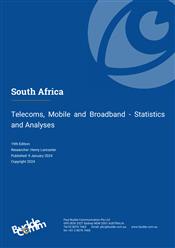South Africa Telecoms Market Report
Telecoms, Mobile and Broadband - Statistics and Analyses

Last updated: 9 Jan 2024 Update History
Report Status: Current
Report Pages: 253
Analyst: Henry Lancaster
South Africans accessing more satellite internet solutions
South Africa’s telecom sector boasts one of the most advanced infrastructures on the continent. There has been considerable investment from Telkom, Liquid Intelligence Technologies, Broadband InfraCo, and municipal providers as well as from the mobile network operators MTN and Vodacom, all aimed at improving network capabilities. Vodacom in late 2023 made a bid to merge with MAZIV, in which it has a 30% stake, to improve its presence in the fibre broadband sector. This has so far been blocked by the Competition Commission.
The focus in recent years has been on backhaul capacity and on fibre and LTE networks to extend and improve internet service connectivity. With the ongoing migration to fibre, the incumbent telco Telkom expects to close down its copper network by the end of 2024. Several satellite solutions also appeared in 2023, aimed at providing additional backhaul and improving connectivity in rural areas. Starlink, which provides services in neighbouring Mozambique and Eswatini, has yet to receive a licence to operate in South Africa, though thousands of households access Starlink regardless.
The mobile sector has developed strongly in recent years, partly due to the poor availability and level of service of fixed-line networks, which meant that many people had no alternative to mobile networks for voice and data services.
A multi-spectrum auction delayed several times due to legal wrangling was finally held in March 2022. The delay caused difficulties for network operators, which were forced to refarm spectrum for 3G and LTE use, and provide 5G services on temporary licences. Six qualified bidders acquired spectrum. This raised ZAR14.4 billion, though by the end of 2023 a large proportion of the licence fees remained unpaid.
The market has shrugged off the economic impact of the pandemic, which caused significant difficulties for production and supply chains and saw a slowdown in some network expansions, particularly around 5G. However, since 2022 the national power gird has come under considerable strain. Load-shedding has become the norm, leading to telcos having to invest in other power sources (mainly diesel and solar), thus impacting on revenue.
The report also covers the responses of the telecom operators as well as government agencies and regulators as they react to the crisis to ensure that citizens can continue to make optimum use of telecom services. This can be reflected in subsidy schemes and the promotion of tele-health and tele-education, among other solutions.
Key developments
- Cell C switches off its own network and completes its migration to a virtual RAN operating on MTN’s network.
- Competition Commission recommends against merger of Vodacom South Africa with MAZIV.
- Wireless ISPs gain access to 6GHz spectrum.
- Satellite broadband gaining traction despite Starlink not yet receiving a licence.
- Telcos’ finances impacted by continued power load-shedding.
- Report update includes the regulator's annual report for 2022, March 2023 report on the ICT sector, operator data to Q3 2023, updated Telecom Maturity Index charts and analyses, recent market developments.
Companies mentioned in this report
Vodacom, MTN (MTN Network Solutions), Cell C, Telkom (Heita, 8ta), Virgin Mobile, Neotel, Atlantic Internet Services, Business Connexion, Internet Solutions, Verizon Business, MWEB, Vox Telecom (DataPro), Sentech, iBurst (WBS, Blue Label), Liquid Intelligence Technologies, Virgin Mobile, Broadband InfraCo, Transtel, Eskom, SEACOM, Transtel, Eskom, SITA, Sentech, Dark Fibre Africa (DFA), FibreCo, eFive, WASACE.
Related Reports
- Africa - Fixed Broadband Market - Statistics and Analyses
- Africa - Mobile Infrastructure and Mobile Broadband
- Africa - Mobile Network Operators and MVNOs
- Zambia - Telecoms, Mobile and Broadband - Statistics and Analyses
- Rwanda - Telecoms, Mobile and Broadband - Statistics and Analyses
- Uganda - Telecoms, Mobile and Broadband - Statistics and Analyses
- Egypt - Telecoms, Mobile and Broadband - Statistics and Analyses
- Cameroon - Telecoms, Mobile and Broadband - Statistics and Analyses
- Kenya - Telecoms, Mobile and Broadband - Statistics and Analyses
- Nigeria - Telecoms, Mobile and Broadband - Statistics and Analyses
Share this Report
TMT Intelligence
A platform to scale your intelligence tasks
Monitor critical insights with our AI-powered Market Intelligence Platform gathering and analyzing intelligence in real time. With AI trained to spot emerging trends and detect new strategic opportunities, our clients use TMT Intelligence to accelerate their growth.
If you want to know more about it, please see:
Research Methodology
BuddeComm's strategic business reports contain a combination of both primary and secondary research statistics, analyses written by our senior analysts supported by a network of experts, industry contacts and researchers from around the world as well as our own scenario forecasts.
For more details, please see:
More than 4,000 customers from 140 countries utilise BuddeComm Research
Are you interested in BuddeComm's Custom Research Service?
Hot Topics
News & Views
Have the latest telecommunications industry news delivered to your inbox by subscribing to BuddeComm's weekly newsletter.